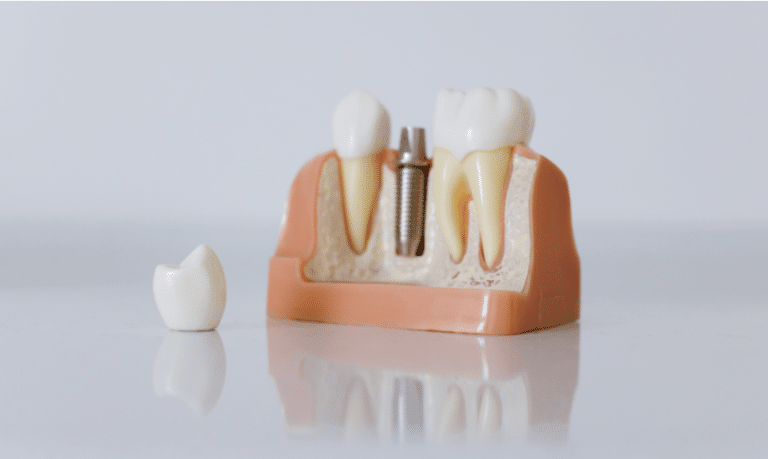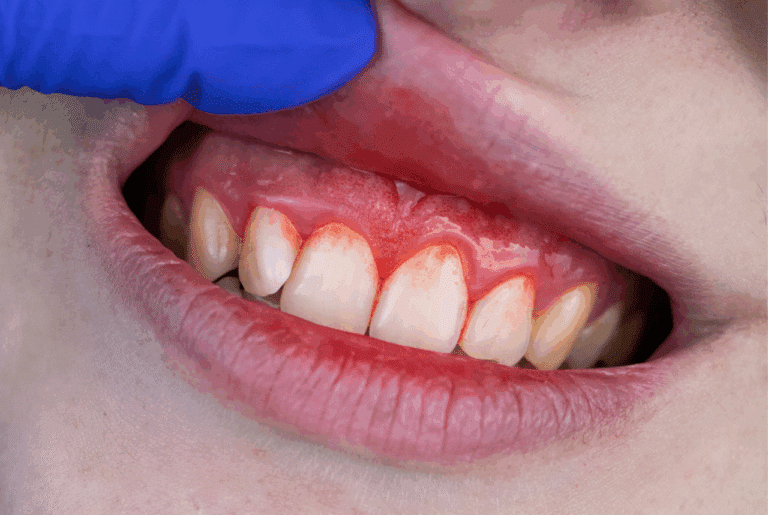Losing teeth can feel overwhelming, but dentures offer a reliable way to restore your smile, confidence, and oral health. This comprehensive guide walks you through everything—from preparing for dentures, understanding the different types, their longevity, to what life looks like once you get them.
Process of Getting Dentures: Why it Matters
Getting dentures isn’t just about replacing missing teeth—it’s a journey that involves multiple steps to ensure the best fit, comfort, and long-term success. Knowing what to expect can make the entire experience more manageable and empowering.
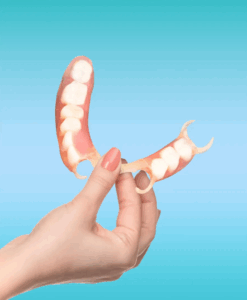
- Helps You Prepare Mentally and Emotionally: Knowing the stages—from consultation to fitting—reduces uncertainty and eases the transition, especially for first-timers.
- Improves Decision-Making: Being informed allows you to make confident choices about the type of dentures, materials used, and the care involved.
- Sets Realistic Expectations: Knowing the process helps you anticipate timelines, adjustments, and the short adaptation period after receiving your dentures.
- Encourages Better Follow-Up Care: Awareness of each step encourages consistent follow-ups and proper denture maintenance for long-term comfort.
In short, being well-informed means you’re not just getting dentures—you’re actively taking charge of your oral health journey. With the right knowledge and support, you can approach each step with clarity, make confident decisions, and feel empowered knowing you’re investing in a healthier, more comfortable future.
Step-by-Step: The Process of Getting Dentures
At WeSmile Dental, we aim to make the journey as smooth and stress-free as possible. Here’s what you can expect:
1. Initial Consultation and Dental Examination for Dentures
Your journey begins with a thorough dental assessment. We’ll examine your gums, any remaining teeth, and overall oral health. This is also a chance for us to understand your concerns, preferences, and lifestyle goals.
If you’re researching on behalf of a parent or older relative, we understand how much you care about their well-being. Our team has experience in geriatric dentistry and will take the time to explain every step, listen to your concerns, and ensure your loved one feels at ease.
👉 For more insight, visit our blog: Dental Appointments for the Elderly – Step by Step
2. Recommendation and Planning for Dentures
Based on your oral condition and personal needs, we’ll recommend the most suitable denture solution. We’ll walk you through what to expect, explain the pros and cons, and help you make an informed decision.
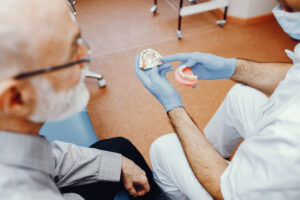
3. Impressions and Bite Measurements for Dentures
Next, we take precise moulds of your mouth, jaw, and bite alignment. These detailed impressions are sent to a trusted dental laboratory, where your custom-made dentures are carefully crafted.
4. Trial Fitting and Adjustments for Dentures
You’ll try on a wax version of your denture to assess appearance, fit, and bite. This step allows us to fine-tune the shape and comfort before your final denture is made.
5. Final Fitting for Dentures
Once your dentures are ready, we’ll ensure they fit well and feel natural. We’ll also provide guidance on wearing and caring for them. Minor adjustments can be made on the spot if needed.
6. Follow-Up and Ongoing Care for Dentures
We don’t just stop at the fitting — we’re committed to long-term care and your loved one’s continued comfort. Follow-up appointments allow us to monitor how the dentures are settling, check for any pressure spots or discomfort, and make necessary refinements over time.
At WeSmile Dental, we hold ourselves to high standards of care, especially when it comes to our elderly patients who may need extra support. Our commitment to safety, hygiene, and patient-centered care is outlined in our Quality Assurance Promise, so you can feel confident your loved one is in capable, caring hands.
Our experienced team is always here to answer questions, provide reassurance, and support you and your family every step of the way — because we know that good dental care is not just about teeth, but about people.
How to Prepare for Getting Dentures (Before Consultation)
Before your consultation, it’s helpful to prepare yourself mentally and physically for the journey ahead. Here’s what you can do:
- Maintain Good Oral Hygiene: Keep your mouth clean to avoid infections or inflammation.
- List Your Questions: Prepare any questions or concerns you want to discuss with your dentist.
- Gather Dental Records: If you have previous X-rays or dental histories, bring them along.
- Understand Your Medical History: Be ready to share any health conditions or medications you take, as these may affect your treatment.
- Set Realistic Expectations: Know that dentures might require an adjustment period but will greatly improve your quality of life.
When you arrive for your consultation, your dentist will perform a thorough oral assessment, possibly including X-rays or 3D imaging, to understand your mouth’s structure. You might need tooth extractions or treatment of gum disease before dentures can be fitted. Impressions of your gums and jaw will be taken to create dentures tailored just for you.
Different Types of Dentures: Detailed Descriptions
Each denture type serves a specific purpose to restore your smile and support your oral health based on your needs and lifestyle.
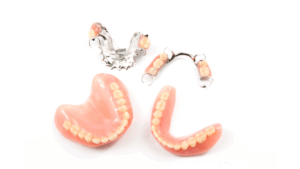
Denture Type |
Denture Description |
|---|---|
Partial Dentures |
Designed for patients who still have some natural teeth. They fill in the gaps using prosthetic teeth attached to a gum-coloured base, supported by clasps. |
Suction Dentures (SEMCD) |
These dentures provide a natural suction seal on the lower jaw for better stability and comfort, ideal for those struggling with lower denture retention. Our SEMCD-trained dentist, Dr. Sara Tan, specialises in this technique and is known for her gentle, detail-oriented care. |
Full Dentures |
Used when all teeth in an arch are missing. Custom-made to fit the entire gum area and restore full function and appearance. |
Implant Overdentures & All-on-4/6 |
Dentures fixed securely to implants, offering superior stability and function, often used for patients seeking a more permanent solution. |
Flexible Dentures |
Made from lightweight thermoplastic materials, flexible dentures offer comfort and a natural look without the use of metal clasps. |
Single Tooth Denture (Flipper) |
A temporary, quick solution for replacing one missing tooth, primarily for aesthetics and short-term use. |
Different Types of Dentures: Process Time and Longevity
The time to make and lifespan of dentures vary by type, helping you choose the best option for your situation.
Denture Type |
Denture Process Time |
Denture Longevity |
|---|---|---|
Partial Dentures |
2 to 4 weeks | 5 to 7 years |
Suction Dentures (SEMCD) |
3 to 5 weeks | 4 to 6 years |
Full Dentures |
4 to 6 weeks (+ healing time if extractions) | 5 to 8 years |
Implant Overdentures & All-on-4 / All-on-6 |
2 to 6 months | 10 to 15+ years |
Flexible Dentures |
2 to 4 weeks | 5 to 7 years |
Single Tooth Denture (Flipper) |
1 to 2 weeks | 1 to 3 years |
Adjusting to Life with Dentures: What to Expect
Getting your new dentures is an exciting milestone, but adapting to them takes a little time and patience. Here’s what to expect:
- Initial Sensation: Dentures may feel bulky or loose at first, with some mild soreness or extra saliva production. This usually improves as your mouth adjusts.
- Speaking: You might notice slight changes in your speech. Reading aloud or speaking slowly can help your tongue and lips get used to the new feel.
- Eating: Start with soft, small pieces of food and avoid sticky or hard foods until you gain confidence chewing.
- Oral Hygiene: Clean your dentures daily, rinse your mouth and floss to keep your gums and tongue healthy.
- Follow-up Visits: Expect a few adjustment appointments to ensure your dentures fit comfortably and function well.
Everyone’s experience is unique, but with time and proper care, dentures will feel like a natural part of you—helping you eat, speak, and smile confidently again.
Caring for Your Dentures: Tips for Daily Maintenance
Proper daily care is essential to keep your dentures in great condition, prolong their lifespan, and maintain your oral health. Here’s how to care for your dentures effectively:
How to Clean Your Dentures Properly
- Rinse After Eating: Remove and rinse your dentures under running water to wash away food particles and prevent staining.
- Brush Daily: Use a soft denture brush or a soft-bristled toothbrush with a mild, non-abrasive cleanser designed for dentures. Avoid regular toothpaste as it can scratch the surface.
- Soak Overnight: Place dentures in a denture cleaning solution or plain water overnight to keep them moist and retain their shape. Follow the product instructions carefully.
- Handle With Care: Dentures are delicate—clean them over a folded towel or basin of water to avoid damage if dropped.
- Avoid Hot Water: Never use hot or boiling water, as it can warp dentures.
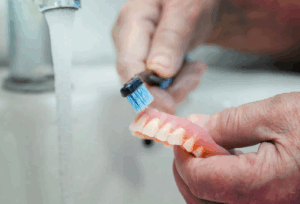
Man brushing his dentures
Maintaining Oral Hygiene
- Clean Your Mouth: Brush your gums, tongue, and palate every morning with a soft toothbrush before inserting your dentures to stimulate circulation and remove plaque.
- Regular Dental Check-ups: Visit your dentist regularly for professional cleaning, denture inspections, and adjustments to ensure a comfortable fit and healthy mouth.
Tips to Avoid Damage
- Avoid using bleach or harsh chemicals on your dentures—they can weaken and discolour them.
- Don’t attempt to adjust or repair dentures yourself; always see a dental professional.
- Avoid chewing very hard, sticky, or tough foods that may damage or dislodge your dentures.
Following these simple but important steps will help keep your dentures comfortable, clean, and durable—helping you smile confidently every day.
Why Choose WeSmile Dental for Your Dentures in Singapore?

At WeSmile Dental, we provide a range of denture solutions designed to suit your lifestyle and oral health needs. Whether you require partial, full, flexible, or implant-supported dentures, our team offers personalised care every step of the way—from consultation to fitting and follow-up.
We use high-quality materials such as acrylic, flexible nylon, porcelain, and cobalt-chrome to ensure your dentures are both functional and natural-looking. Our dentures are custom-made to fit comfortably, support your bite, and restore your smile.
Book Your Appointment Today
Ready to take the first step towards a confident, comfortable smile? Whether you’re considering partial, full, flexible, or implant-supported dentures, WeSmile Dental is here to guide you with expert care and personalised support. Let us help you restore function, comfort, and confidence—so you can smile, eat, and live well again. Book your consultation and start your journey today.
Frequently Asked Questions (FAQs)
- Will dentures affect my speech?Slight speech changes are common initially but most adjust within a few weeks by practicing speaking regularly.
- Can I sleep with my dentures?Dentists usually recommend removing dentures before sleeping to let gums rest and reduce infection risk.
- Are dentures comfortable?Modern dentures are designed for comfort, but it takes time to adjust. Regular dental check-ups help manage any discomfort.
- What should I do if my dentures feel loose or painful?Visit your dentist promptly for adjustments. Ill-fitting dentures can cause sores and discomfort.

